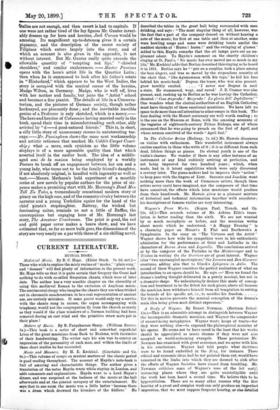A Study of Wagner. By Ernest Newman. (Bertram Dobai- l2s.)—This
is an admirable attempt to distinguish between Wagner the incomparable dramatic musician. and Wagner the compounder of unconvincing metaphysics. Wagner wrote heaps of tracts—for they were nothing else—to expound the philosophical meaning of his operas. He seems not to have cared in the least that his works should be appreciated as music dramas if they were not also accepted as world-redeeming evangels. These pretensions Mr. Newman has examined with great acuteness, and we agree with him in his conclusions. Wagner had told people what doctrines were to be found embedded in the Bing, for instance. These ethical and economic ideas, had he not pointed them out, would have remained in the limbo into which they are doomed to sink after the efforts of Wagner Societies have ceased from troubling. Mr. Newman criticises some of Wagner's uses of the leit tnotlf, instancing places where they are quite unintelligible until the work has been heard a second time. We believe this to be hypercriticism. There are so many other reasons why the first hearing of a great and complex work can only produce an imperfect impression, that we must suppose frequent hearing, or else detailed study, which does away with the objection. Mr. Newman's apprecia- tion of the music is as complete as his disbelief in the metaphysical theories of Wagner, and so he is in no way a prejudiced critic. The book is a valuable one, though the author falls into wine of the errors he condemns, when he gives us his philosophic system in dis- cussing Parsifal. His theories are as unconvincing to us as Wagner's are to him.







































 Previous page
Previous page